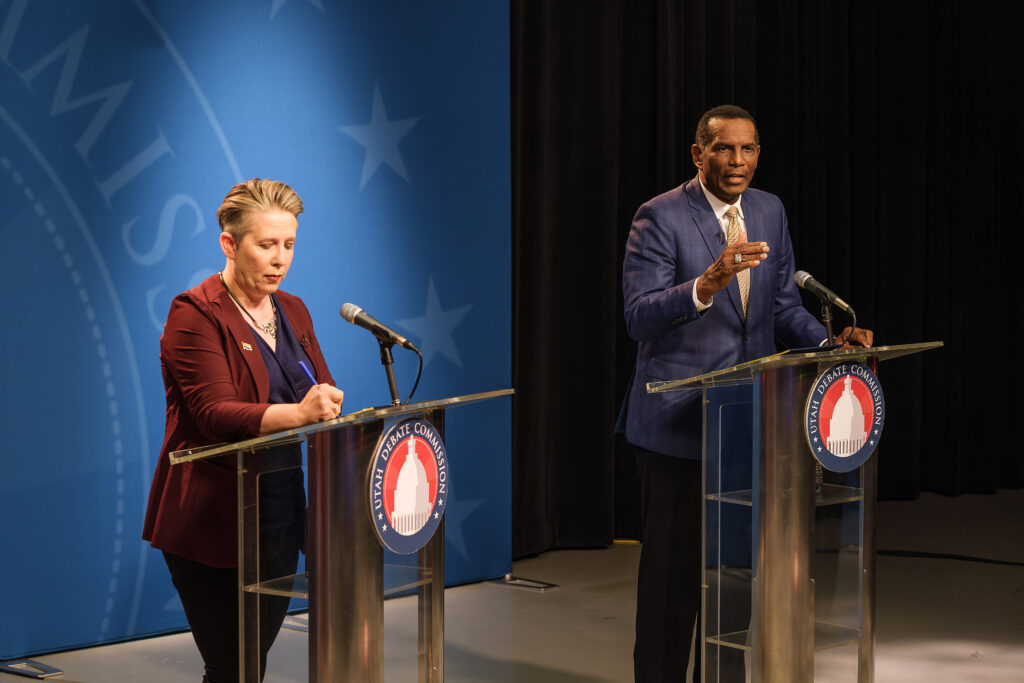In the recent debate for Utah’s 4th Congressional District, Democratic candidate Katrina Fallick-Wang and Republican incumbent Rep. Burgess Owens confronted various contentious issues, finding both common ground and sharp disagreements particularly over topics related to LGBTQ+ rights, abortion, and education. The debate, held at the University of Utah, showcased Fallick-Wang’s passionate defense of her sixth-grade transgender child, emphasizing the need for understanding and support for transgender individuals. Despite her emotional appeal, Owens maintained his position against allowing biological males to compete in women’s sports, arguing that it undermines fairness and equity in competition. He expressed concern about the implications of gender identity discussions for young children, advocating for a clear definition of biological sex to uphold what he sees as necessary boundaries in youth sports.
On the issue of transgender participation in sports, Fallick-Wang strongly argued against the notion that individuals choose to identify as transgender for competitive advantage. Rather, she articulated that the experiences of transgender individuals are challenging, filled with hardship, and not driven by trivial motivations like wanting to win a basketball game. Her vision centered on allowing people to live authentically, which she described as a fundamental aspect of freedom in America. In contrast, Owens referenced scientific principles and his competitive background to justify his stance, foreseeing negative consequences where young men compete against women, thereby compromising the integrity of women’s sports and leading to emotional distress for female athletes.
Abortion rights emerged as another key area of divergence. Owens criticized federal involvement in abortion, framing the issue as one that should be settled at the state level rather than dictated by the federal government—a viewpoint reflecting a broader conservative argument advocating for states’ rights over federal mandates. Fallick-Wang, however, presented abortion as critical healthcare and maintained that decisions should be made by individuals in consultation with their doctors rather than legislators. She warned against government overreach into personal health matters, emphasizing the importance of maintaining personal autonomy and private medical decisions.
The candidates also clashed over the hot-button topic of education, particularly in relation to Utah’s recently established “Utah Fits All” school choice voucher program. Owens championed the voucher system as a proactive means for parents to tailor their children’s education to suit their unique strengths and aspirations, characterizing opposition to the program as a resistance to progress and opportunity. He argued that empowering parents enhances the quality of education and aligns with American values of choice and individualism. Conversely, Fallick-Wang criticized the reliance on vouchers as a viable solution, arguing that equitable and high-quality education should not be a luxury determined by geographic location or financial resources.
Fallick-Wang’s perspective underscores a belief that educational funding should be universal and robust, irrespective of local economic conditions. She stressed that disparities in educational quality rooted in differences among states or even within communities due to socioeconomic factors are unacceptable. The debate echoed her call for ensuring that all children have access to quality public education as a fundamental right, as well as advocating against systemic inequities that jeopardize future opportunities.
As the debate progressed, both candidates illustrated their contrasting visions for Utah and the nation. While they occasionally found consensus on the desire for localized governance in specific issues, their approaches diverged sharply on the implications for society regarding personal rights, health decisions, and educational equity. This clash reflects not just individual candidate viewpoints but broader ideological divides that characterize contemporary political discourse in the United States. As Utah voters prepare for the upcoming election, these discussions highlight the significance and implications of the choices they face in shaping their state’s future and addressing the contentious cultural debates that resonate deeply within their community.

